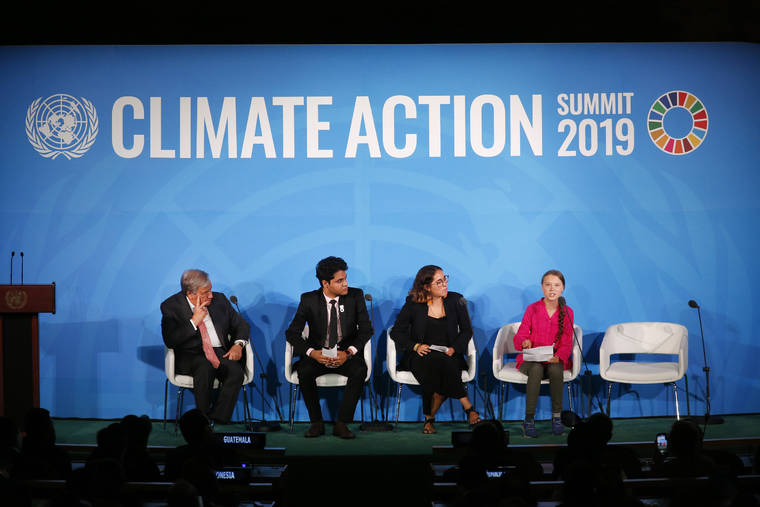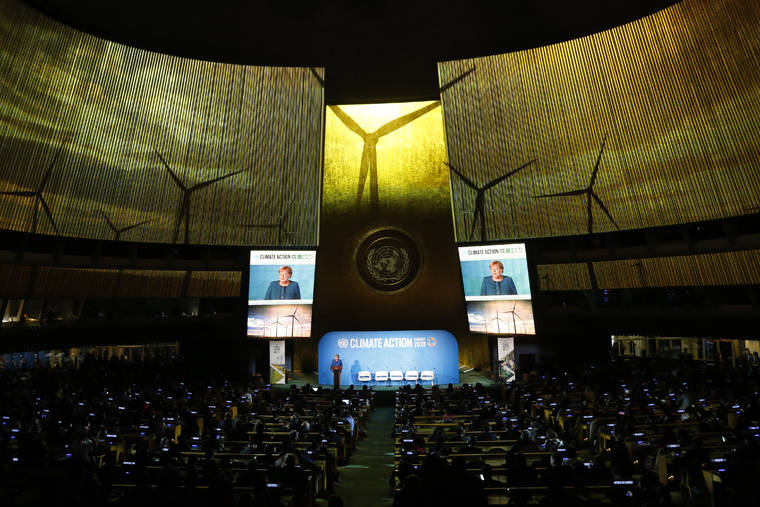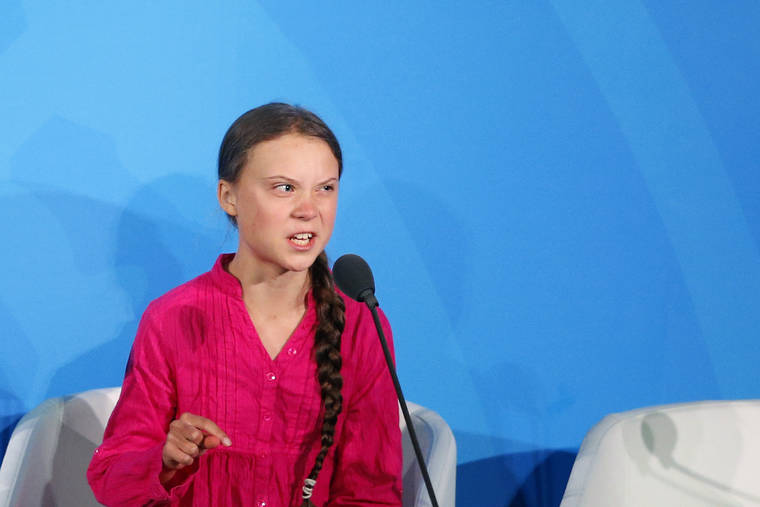Climate experts say they hear talk at UN but not much action

United Nations Secretary-General Antonio Guterres, far left, and young environmental activists look on as Greta Thunberg, of Sweden, far right, addresses the Climate Action Summit in the United Nations General Assembly, at U.N. headquarters, Monday, Sept. 23, 2019. (AP Photo/Jason DeCrow)

Germany’s Chancellor Angela Merkel addresses the Climate Action Summit in the United Nations General Assembly, at U.N. headquarters, Monday, Sept. 23, 2019. (AP Photo/Jason DeCrow)

Environmental activist Greta Thunberg, of Sweden, addresses the Climate Action Summit in the United Nations General Assembly, at U.N. headquarters, Monday, Sept. 23, 2019. (AP Photo/Jason DeCrow)
UNITED NATIONS Leader after leader told the United Nations on Monday that they will do more to prevent a warming world from reaching even more dangerous levels. But as they made their pledges at the Climate Action Summit, they and others conceded it was not enough.
UNITED NATIONS — Leader after leader told the United Nations on Monday that they will do more to prevent a warming world from reaching even more dangerous levels. But as they made their pledges at the Climate Action Summit, they and others conceded it was not enough.
Sixty-six countries have promised to have more ambitious climate goals and 30 swore to be carbon neutral by midcentury, said Chilean President Sebastian Pinera Echenique, who is hosting the next climate negotiations later this year.
Outside experts say they hear a lot of talk but not the promised action needed to keep warming to a few tenths of a degree. They say it isn’t adding up to the dramatic changes the world requires.
Bill Hare, who follows national emissions and promises for Climate Action Tracker, called what was said “deeply disappointing” and not adding up too much.
“The ball they are moving forward is a ball of promises,” said economist John Reilly, co-director of MIT’s Joint Center for Global Change. “Where the ‘ball’ of actual accomplishments is, is another question. We have not seen global emissions drop dramatically — they dropped for a couple of years but crept back up. So the ball of accomplishments is well behind the ball of promises.”
David Waskow, international climate chief at the World Resources Institute, said smaller nations are making commitments, but the big carbon polluters — the U.S., China, the European Union and others that make up the majority of emissions — still aren’t stepping up.
“What we’ve seen so far is not the kind of climate leadership we need from the major economies,” said World Resources Institute Vice President Helen Mountford. She did say, however, that businesses, as well as small- and medium-sized countries, had “exciting initiatives.”
Heads of nations such as Finland and Germany promised to ban coal within a decade. Several also mentioned goals of climate neutrality — when a country is not adding more heat-trapping carbon to the air than is being removed by plants and perhaps technology — by 2050.
U.S. President Donald Trump dropped by the summit, listened to German Chancellor Angela Merkel make detailed pledges, including going coal-free, and left without saying anything.
The United States did not ask to have someone speak at the summit, U.N. officials said. And Secretary-General Antonio Guterres had told countries they couldn’t be on the agenda without making bold new proposals.
Even though there was no speech by Trump, who has denied climate change, called it a Chinese hoax and repealed U.S. carbon-reduction policies, he was talked about.
In a none-too-subtle jibe at Trump’s plans to withdraw the United States from the 2015 Paris climate agreement, Chinese Foreign Minister Wang Yi said countries “must honor our commitments and follow through on the Paris Agreement.”
“The withdrawal of certain parties will not shake the collective goal of the world community,” Wang said to applause.
Former New York Mayor Michael Bloomberg, the U.N.’s special climate envoy, thanked Trump for stopping by, adding that it might prove useful “when you formulate climate policy,” drawing a bit of laughter and applause on the floor of the General Assembly.
Before world leaders made their promises in three-minute speeches, 16-year-old climate activist Greta Thunberg gave an emotional appeal in which she chided the leaders with the repeated phrase, “How dare you.”
“This is all wrong. I shouldn’t be up here,” said Thunberg, who began a lone protest outside the Swedish parliament more than a year ago that culminated in Friday’s global climate strikes. “I should be back in school on the other side of the ocean. Yet you have come to us young people for hope. How dare you. You have stolen my dreams and my childhood with your empty words.”
She told the U.N. that even the strictest emission cuts being talked about only gives the world a 50% chance of limiting future warming to another 0.4 degrees Celsius (0.72 degrees Fahrenheit) from now, which is a global goal. Those odds are not good enough, she said.
“We will not let you get away with this,” Thunberg said. “Right now is where we draw the line.”
Hilda Heine, president of the Marshall Islands, said she represents “the most climate vulnerable people on Earth.” Her tiny country has increased its emissions-cut proposals in a way that would limit warming to that tight goal of 1.5 degrees Celsius (2.7 degrees Fahrenheit) since pre-industrial times.
“We are now calling on others to join us,” Heine said.
Guterres opened the summit Monday by saying: “Earth is issuing a chilling cry: Stop.”
“Time is running out,” he said. “But it is not too late.”
He told the more than 60 world leaders scheduled to speak that it’s not a time to negotiate but to act to make the world carbon neutral by 2050.
Several leaders talked about getting off coal, but Climate Action Tracker’s Hare said it wasn’t enough and Barbados Prime Minister Mia Mottley said if the world can make driverless cars, it can tackle climate change.
“There simply can be no more coal power plants after 2020 if we are serious about our future,” she said.
Speaking for small nations that are already being eaten away by sea level rise and blasted by stronger storms, Mottley said, “We refuse to be relegated to the footnotes of history and be collateral damage.”
“The nations of the world are not fighting a losing battle, but the nations of the world are losing this battle today,” Mottley said. “It’s within our battle to win it. The only question is: Will it be too late for the small nations of the world?”
While presidents and premiers talked about what they hoped to do inside their own borders, French President Emmanuel Macron reminded them they must include climate change in their trade and finance policies so they don’t import goods that increase carbon pollution, or fund polluting plants in other countries.
Macron begged other nations to increase their pledges to the Green Climate Fund, which helps poorer nations with climate issues. France, the United Kingdom, Germany, Norway, Denmark and Sweden have recently doubled their pledges.
“We are now at $7 billion,” Macron said. “The target is $10 billion to make up for the United States withdrawal,” and he then suggested America should reconsider adding money, to the applause of other leaders.
More than 130 banks adopted policies that are more responsible and green, said Jamaican Prime Minister Andrew Holmes.
The day before summit, 87 companies announced stepped-up plans to cut greenhouse emissions and be greener, with several CEOs, including energy company chiefs, joining presidents and prime ministers at the microphone.
A decade ago, oil, coal and gas was “at the core of our business model,” said Henrik Poulsen, CEO for Danish energy company Orsted. But the company has gone wind-heavy and reduced heat-trapping carbon dioxide emissions by 83% since 2006. The company will quit coal in 2022 and be carbon neutral by 2025, he added.
“Action, action, action,” Macron urged. “We cannot leave our young people to spend all of their Fridays protesting.”
———
This version corrects the title of Chinese Foreign Minister Wang Yi.

